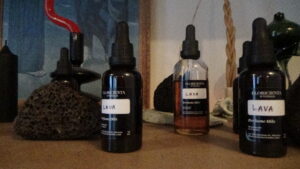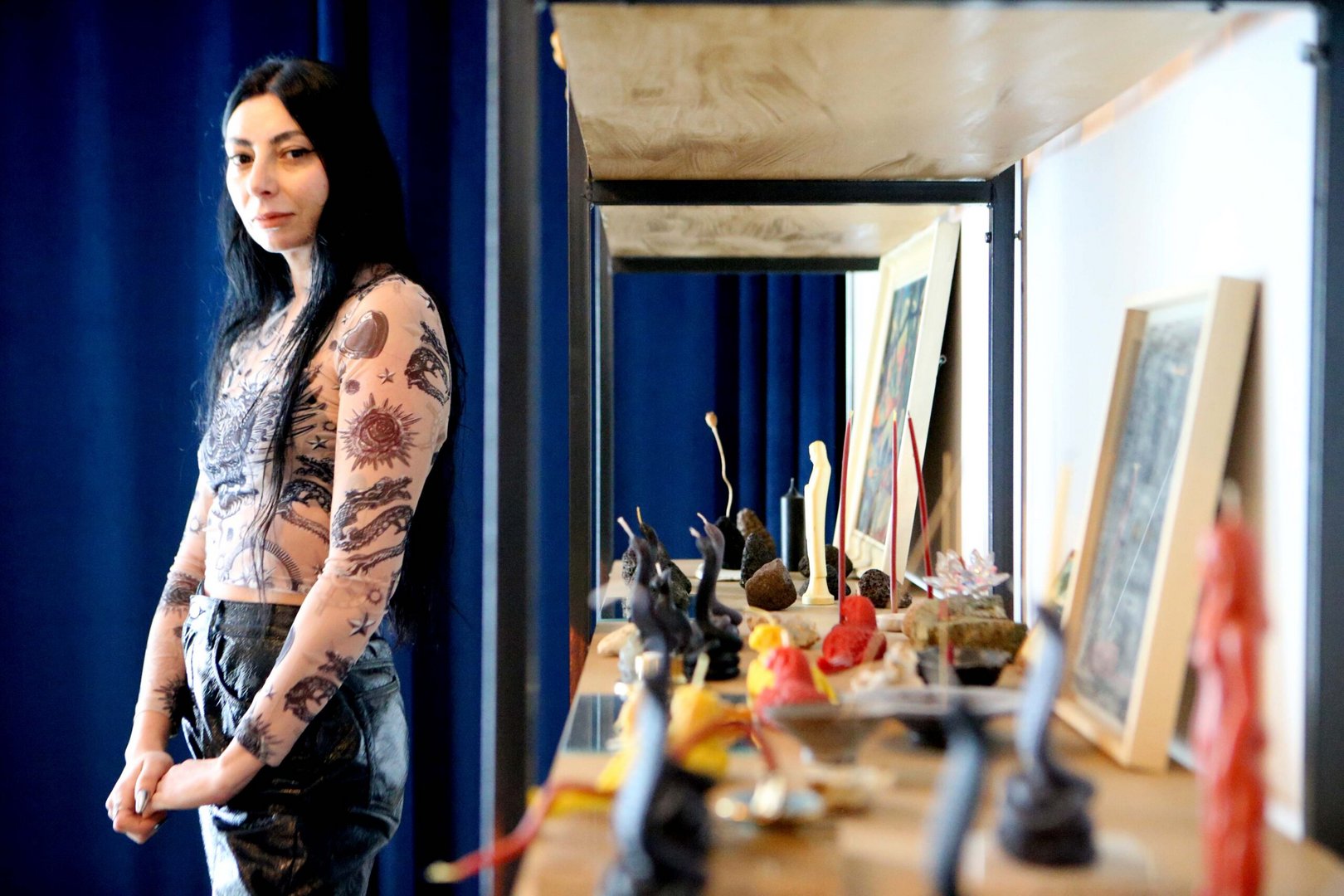In a candle and scent maker THEO PANAYIDES finds a woman who is something of a dreamer, who claims to be a modern witch and a believer that God is in nature
You walk in, and the shop smells of incense – but how does one describe the smell of incense? ‘Pungent’? ‘Fragrant’? It’s a funny thing about our sense of smell. We have common, very specific words to describe the way things taste, and no shortage of adjectives for what we see, hear and touch; when it comes to describing scents, though, our vocabulary is limited. “It’s because smell is more of a feeling,” says Chrysa Gregoriou, sitting in what she playfully calls the ‘opium room’ in her shop (Floricienta Iuvenalis) in Nicosia. Smell stirs emotion in the mind, bypassing reason; it evokes memories. You might catch a whiff of jasmine and be suddenly transported back to childhood, and your grandma watering her jasmine plants on a warm afternoon.

Some, I assume, will roll their eyes. There’s a lot about Chrysa that’ll make some people roll their eyes – her beliefs, her style, her shop, even her look. She’s tall, slim, fine-featured, sloe-eyed, exotic in general; she has long black hair and long fake nails, a cross around her neck and a snake tattoo near her temple – and of course she wears her own perfumes (smell is important!), having started the day by applying a few dabs of Petrichor, one of her three new fragrances. Petrichor is an earthy scent, the smell of damp earth after rain; the name comes from ‘petra’, Greek for ‘rock’, and ‘chor’, defined by Wikipedia as “the ethereal fluid that runs in the blood of the gods in Greek mythology”. Like I said, some may roll their eyes.
But why dwell on those people? Not only does Chrysa herself not care what others think – not after all she’s been through – but there’s also a strong community around Floricienta Iuvenalis. Each year there’s a gathering at the shop to mark the winter solstice (December 21); last year’s event attracted dozens of revellers, swaying to ambient music and tossing bay leaves into a small bonfire (it’s a ritual; you write your wish on the leaf – ‘healing’, ‘money’, ‘love’ – and allow the fire to consume it). Her Facebook page called the faithful to the solstice frolics with a cryptic dedication – “For all the grieving and broken hearted” – and she also likes to strike eye-catching poses on Instagram (@chrysafin) for her 1,600 followers. Is she something of an influencer? Kind of, she replies, “though I don’t like the way the term is used nowadays”. One thing’s for sure: after all these years, people know her.
The shop is important, of course – but her past is important too, to explain how she got here. As a child she was “very closed-off, and a bit of a tomboy. I was always in my own little world – I’m a dreamer, I create my own world”. Her dad was an engineer, her mother a nurse; they divorced when the girl was nine, and she stayed with her mum. Money was tight from the start: “I’ve been working since the age of 14”.
Her childhood scent may be roses, but “my life hasn’t been strewn with rose petals,” says Chrysa wryly; there’s a melancholy side to her personality. She spent a decade doing odd jobs, working as a waitress and salesgirl. “I was always on my own as – as a person, let’s say, trying to find my way, but my main goal was just to survive. I was kind of lost, I was like a wild animal in those days”. As an angry teen, she shaved her head and wore punkish collars with massive spikes. At 24, she lost her mother and decided to study in the UK – a bold decision, since she had no money and didn’t even speak English, but she made her way to England, worked on a portfolio and managed to study Art and Design in Newcastle. She discovered herself in those years, she tells me, “I found a strength I didn’t know I had”; one might say she came to terms with the unconventional style she’d previously kept bottled up. Back in Cyprus, she became a fixture in trendy-bohemian circles – a year as a receptionist at designer hair salon Blow (the owner of Blow, Angelos Pattas, is a good friend), working the door at Club D, a spell as a beauty editor at assorted blogs and magazines. Like she says, people knew her – even before she opened the shop five years ago, coming into her own.

Does she have any babies of her own?
She smiles: “I have cats”.
We sit at the table sipping dainty cups of jasmine tea, the back door open as a tribute to Covid (Chrysa had her own reasons to dread catching the bug, given that losing your sense of smell is one of the symptoms; fortunately, her bout was mild). It’s a wet winter’s day, the steady patter of rain on concrete mingling with the soothing sounds of a Spotify playlist. The front of the shop is full of plants, indeed any passerby going by the name and lush vegetation in the window would assume Floricienta to be a florist’s or a nursery. Plants and flowers are her life, she enthuses, Nature in general is “my greatest inspiration. She’s our mother, she’s the Earth. She’s the one who’ll heal us, who’ll inspire us”.
The shop is open Tuesday to Saturday. Every single Sunday, Chrysa and her partner Stelios venture out to the countryside to “recharge my batteries”. Stelios, a photographer, looks for imposing landscapes, she collects flowers and resins for her fragrances (she makes perfume oils, essential oils blended with natural scents) and generally communes with Nature. “I always have to touch,” she explains. “To listen to the earth, to the leaves.” She recalls a trip to see a 100-year-old olive tree in some random village, and throwing her arms around the trunk, exultant – only for Stelios to tap her on the shoulder and point out a snake slithering into a hollow in the tree, inches away.
Even then, says Chrysa, she was startled more than frightened. She likes snakes, hence her cobra-shaped candles; snakes are “a symbol of protection, for me”. There’s a cobra statue on her window sill, to protect from enemies, just as there’s a crystal (selenite) at the entrance door, for good energy. That’s a whole other facet, of course, what she calls her “medicines” and others might call her superstitions. (Sleeping on her childhood pillow also belongs in this category.) Her spirituality is eclectic, almost indiscriminate. She’s something of a pantheist, seeing God in Nature, but also has a Buddhist belief in reincarnation and past lives, and a pagan faith in the goddess Aphrodite – and she’s also a Christian, hence the cross around her neck and the Bible on the table. She grew up devout, a churchgoer, one of the little girls sprinkling rosewater in church on Good Friday; she still says her prayers every night before going to bed. Then again, the family were Orthodox but not entirely orthodox; her mum and grandma – Tarot readers both – were “a bit more… witchy?” she says, and laughs delightedly.
“Bonjour witches” reads another post on the shop’s Facebook page – a sly little half-joke, and a reminder of the dark side of scents. Circe used her perfume to lure Odysseus and his companions, Cleopatra bathed in coconut milk and essential oils to seduce Mark Antony; perfumes have always been associated with feminine wiles – much like witchcraft itself. Friday is the day for “love spells,” Chrysa declares at one point, speaking of Aphrodite – her devotion is real: she’ll leave offerings for the goddess (roses, honey, red wine, strawberries) at a homemade altar, like they do in Eastern religions, and goes to Aphrodite’s Rock every summer to bathe in her waters – and she does indeed mean magic spells, though also not entirely. ‘Love’ doesn’t have to mean romantic love, it can mean love of self or love of Nature, “and as for magic – well, what is magic? It’s something you set your mind to very intensely, and devote all your energy to”. Magic, to her, is akin to religious faith, or the ‘manifesting’ described in The Secret; a spell is a powerful wish you send out to the universe, forging a path for your desires.
Is she actually a witch, then? Or does she just play one on Facebook?
“I think I’m more of a modern witch,” she replies lightly. She doesn’t read Tarot – but she has her herbs, her cats, her potions, even her teas. She doesn’t drink coffee, can’t stand the stuff; “I don’t know if that counts as witchy…”
Another way of putting it is perhaps that Chrysa is aligned with something bigger – and sensitive, so sensitive, “very, very sensitive,” so much so that she’s actually trying (she says) to become less of an empath. “I get hurt… I mean, I get hurt even if someone uproots a tree. You’re killing a life!” Maybe that’s why she became so extravagantly spiritual, as a kind of defence mechanism; to feel protected by some higher force from the tumult of life. It’s not that the world is too much for her, she learned to deal with that years ago – but she needs her weekly trips into Nature, and she also needs alone time “to ground myself… I like spending time with myself”. She closed the shop for 10 days after New Year’s and never left the house, chilling with her cats, sleeping and reading (currently a book on Japanese architecture); staying in her own little world, as in childhood.
That’s the other thing about our sense of smell: how private it is, how mysterious, how uncanny. You can’t see a smell, you can’t point it out – nor can it ever have a meaning, in the way that sounds contain words. It’s intangible, and barely describable; out of all our senses, it’s the one that most reminds us that we’re still, essentially, animals. Maybe that’s why Chrysa Gregoriou finds a kind of primal joy in making perfumes – a process much like cooking (or a witch’s potion), taking little sniffs and adjusting the blend of ingredients.
All these things are alive to her: essential oils with their magical properties, fragrances with the power to cleanse the spirit, Nature in all its various aspects. Through her work “I try to heal myself,” she says. “Through my scents, my prayers. It goes without saying that I say a prayer every time I make a new product… And when I’m out in Nature, collecting gums and resins from tree trunks and leaves, I always thank the tree for giving me these things – I thank Nature. Even if we so much as move a rock, we should thank Nature”. I leave her in the opium room and thoughtfully walk to my car, taking in the crisp, washed-clean smell of the city after the rain.







Click here to change your cookie preferences